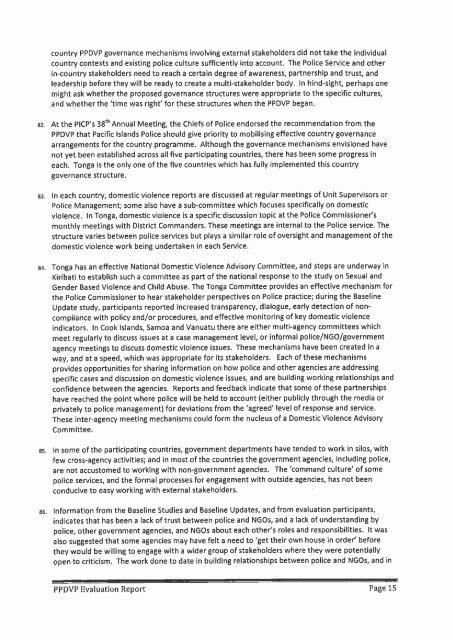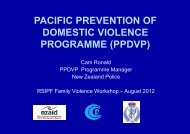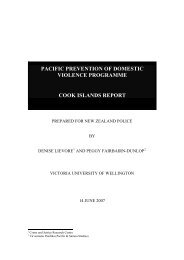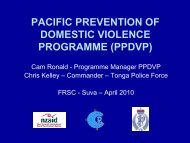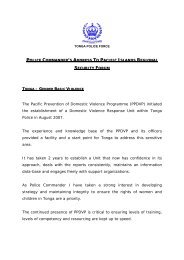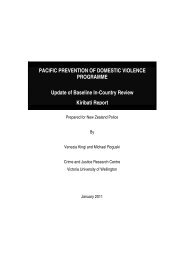PPDVP Evaluation Report - Pacific Prevention of Domestic Violence ...
PPDVP Evaluation Report - Pacific Prevention of Domestic Violence ...
PPDVP Evaluation Report - Pacific Prevention of Domestic Violence ...
Create successful ePaper yourself
Turn your PDF publications into a flip-book with our unique Google optimized e-Paper software.
country <strong>PPDVP</strong> governance mechanisms involving external stakeholders did not take the individualcountry contexts and existing police culture sufficiently into account. The Police Service and otherin-country stakeholders need to reach a certain degree <strong>of</strong> awareness, partnership and trust, andleadership before they will be ready to create a multi-stakeholder body. In hind-sight, perhaps onemight ask whether the proposed governance structures were appropriate to the specific cultures,and whether the 'time was right' for these structures when the <strong>PPDVP</strong> began.82. At the PICP's 3ath Annual Meeting, the Chiefs <strong>of</strong> Police endorsed the recommendation from the<strong>PPDVP</strong> that <strong>Pacific</strong> Islands Police should give priority to mobilising effective country governancearrangements for the country programme. Although the governance mechanisms envisioned havenot yet been established across all five participating countries, there has been some progress ineach. Tonga is the only one <strong>of</strong> the five countries which has fully implemented this countrygovernance structure.83. In each country, domestic violence reports are discussed at regular meetings <strong>of</strong> Unit Supervisors orPolice Management; some also have a sub-committee which focuses specifically on domesticviolence. In Tonga, domestic violence is a specific discussion topic at the Police Commissioner'smonthly meetings with District Commanders. These meetings are internal to the Police service. Thestructure varies between police services but plays a similar role <strong>of</strong> oversight and management <strong>of</strong> thedomestic violence work being undertaken in each Service.8s. Tonga has an effective National <strong>Domestic</strong> <strong>Violence</strong> Advisory Committee, and steps are underway inKiribati to establish such a committee as part <strong>of</strong> the national response to the study on Sexual andGender Based <strong>Violence</strong> and Child Abuse. The Tonga Committee provides an effective mechanism forthe Police Commissioner to hear stakeholder perspectives on Police practice; during the BaselineUpdate study, participants reported increased transparency, dialogue, early detection <strong>of</strong> noncompliancewith policy and/or procedures, and effective monitoring <strong>of</strong> key domestic violenceindicators. In Cook Islands, Samoa and Vanuatu there are either multi-agency committees whichmeet regularly to discuss issues at a case management level, or informal police/NGO/governmentagency meetings to discuss domestic violence issues. These mechanisms have been created in away, and at a speed, which was appropriate for its stakeholders. Each <strong>of</strong> these mechanismsprovides opportunities for sharing information on how police and other agencies are addressingspecific cases and discussion on domestic violence issues, and are building working relationships andconfidence between the agencies. <strong>Report</strong>s and feedback indicate that some <strong>of</strong> these partnershipshave reached the point where police will be held to account (either publicly through the media orprivately to police management) for deviations from the 'agreed' level <strong>of</strong> response and service.These inter-agency meeting mechanisms could form the nucleus <strong>of</strong> a <strong>Domestic</strong> <strong>Violence</strong> AdvisoryCommittee.8s. In some <strong>of</strong> the participating countries, government departments have tended to work in silos, withfew cross-agency activities; and in most <strong>of</strong> the countries the government agencies, including police,are not accustomed to working with non-government agencies. The 'command culture' <strong>of</strong> somepolice services, and the formal processes for engagement with outside agencies, has not beenconducive to easy working with external stakeholders.8s. Information from the Baseline Studies and Baseline Updates, and from evaluation participants,indicates that has been a lack <strong>of</strong> trust between police and NGOs, and a lack <strong>of</strong> understanding bypolice, other government agencies, and NGOs about each other's roles and responsibilities. It wasalso suggested that some agencies may have felt a need to 'get their own house in ordet beforethey would be willing to engage with a wider group <strong>of</strong> stakeholders where they were potentiallyopen to criticism. The work done to date in building relationships between police and NGOs, and in<strong>PPDVP</strong> <strong>Evaluation</strong> <strong>Report</strong> Page 15


